20 Nov2019
By Ward Cummings

The 2019 ACSR Elections are open and we need you to cast your vote!
The ACSR Annual Election for the Chair-Elect and Region Representatives is now open through December 13. Only the State Chapter President or the ACSR Liaison may vote with the ballot delivered by email.
20 Nov2019
By Loleta Sartin
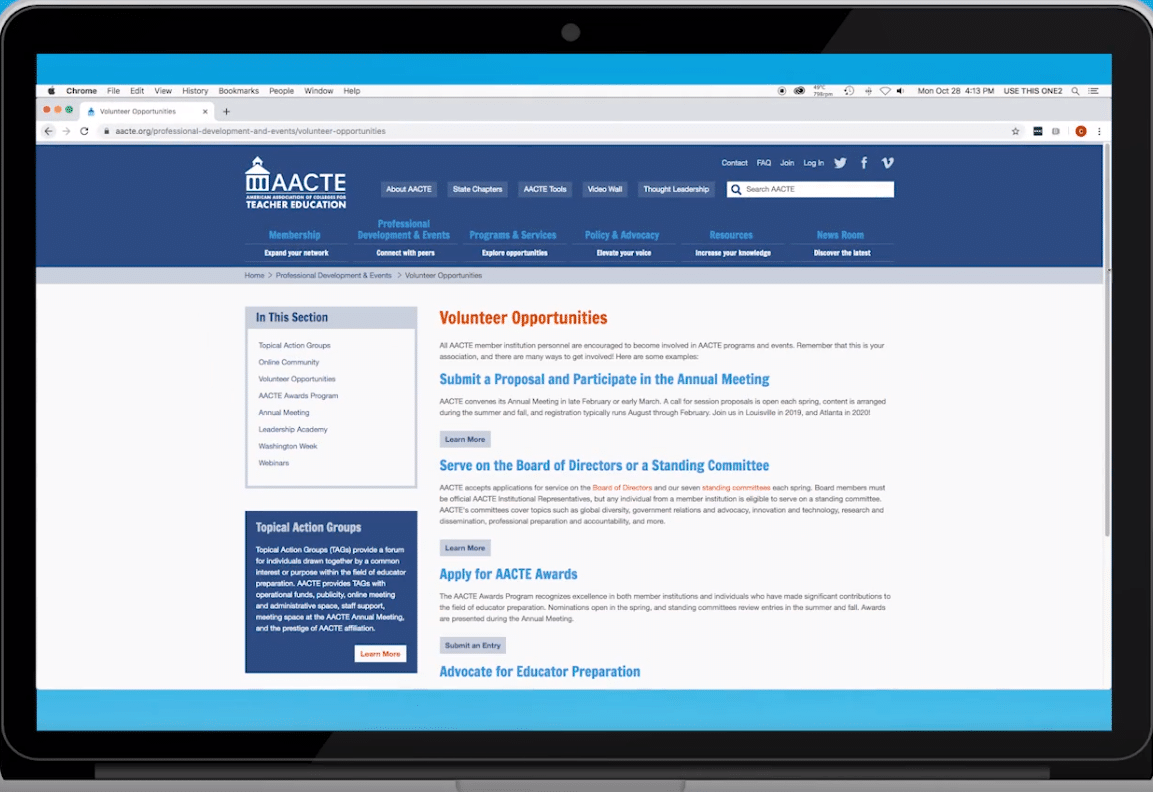 You are vital to AACTE. Your membership, your service, your knowledge, and your presence are vital to the organization.
You are vital to AACTE. Your membership, your service, your knowledge, and your presence are vital to the organization.
As chair of the Committee on Membership Development and Capacity Building, I know firsthand the benefits of membership in AACTE. However, I wasn’t always aware that I could contribute to the organization. Throughout my career, I have consistently worked at AACTE member institutions, but I assumed certain roles in the organization, such as serving on a committee, were reserved for administrators. At that time, little did I know that faculty, staff, and students are fully vested members of AACTE through their institution’s membership.
After attending and presenting at several annual meetings, I knew I wanted to get more involved. I became a member of the committee when I was an associate professor of education. Through interaction with AACTE members with various backgrounds, I soon realized there are opportunities for everyone to become actively involved in AACTE.
20 Nov2019
By Meghan Grenda
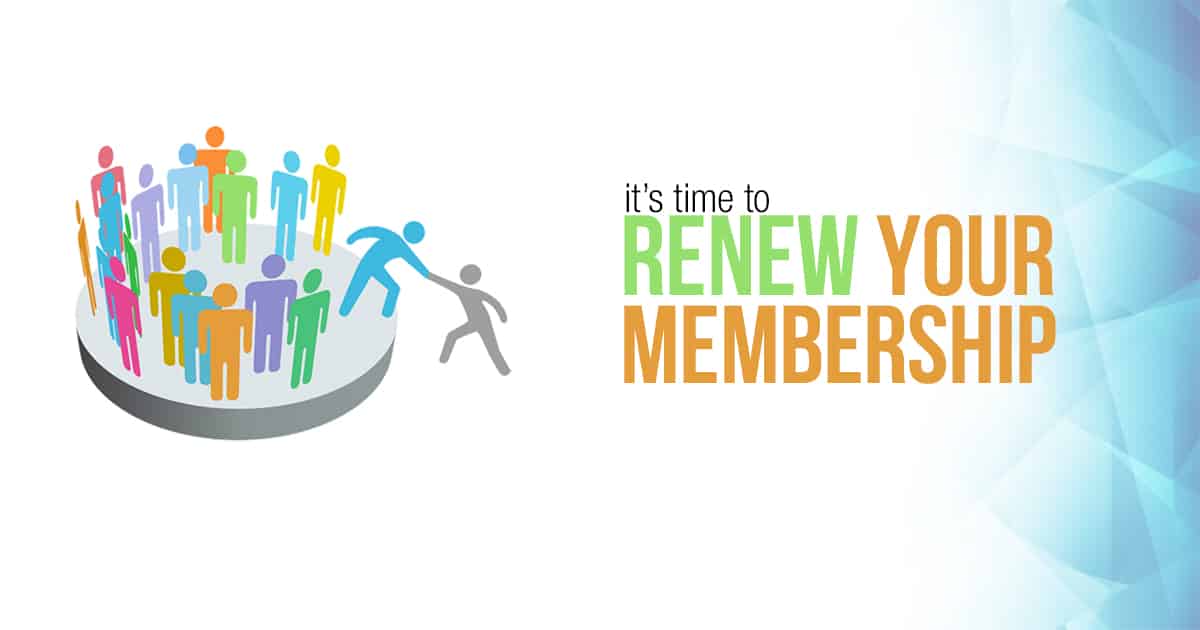
Do you enjoy reading the latest edition of the Journal of Teacher Education (JTE)? Do you access AACTE’s free downloadable resources, such as Colleges of Education: A National Portrait or Education Students and Diversity? Then you won’t want to forget to renew your AACTE membership for 2020!
Your AACTE membership runs from January 1 to the end of the year. To ensure you do not miss the many members-only resources, renew your membership before December 31, 2019.
In addition to the benefits mentioned above, below are a few additional offerings that may be of interest:
20 Nov2019
By Renée A. Middleton
This Opinion article by Renée A. Middleton, a past AACTE president and dean of the Gladys W. and David H. Patton College of Education at Ohio University, originally appeared in the Columbus Dispatch and is reprinted with permission.
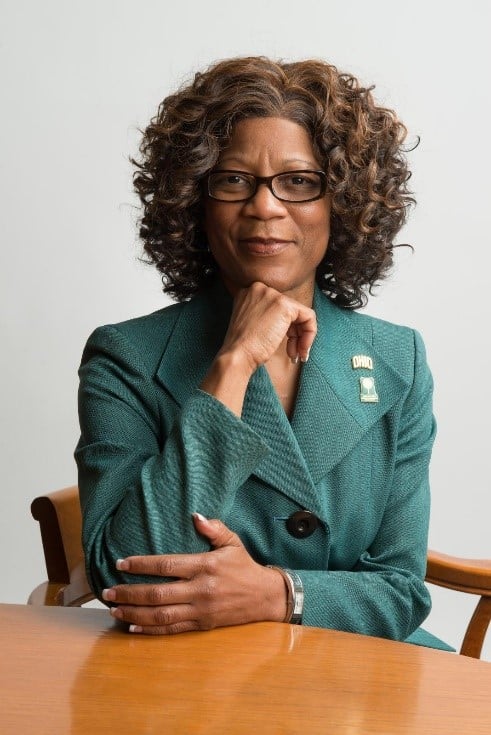
Hate crimes are on the rise in the United States. According to the Anti-Defamation League, the United States last year saw the third-highest number of anti-Semitic incidents since 1979. There were 1,879 reported anti-Semitic acts—a 48% increase from 2016 and a 99% increase from 2015. Ohio, meanwhile, ranked third in the nation in hate crimes in general in 2016, according to the FBI. Columbus has more than doubled the number of reported hate crimes in Cincinnati and Cleveland combined.
These troubling numbers come against the backdrop of a humanitarian crisis at the southern border. Refugees are being separated from their families, detained against their will and are not being treated with dignity and respect. The majority of these refugees are children, who are powerless in every sense of the word.
20 Nov2019
By Maria Hyler

On November 14, I had the privilege of moderating the first in a series of webinars produced through a partnership of AACTE and the Educator Preparation Laboratory (EdPrepLab). This webinar, “Social and Emotional Learning, Cultural Competence, and Equity in Teacher Preparation,” will be followed by three others focusing on transformative research and practice in educator preparation.
Joining me for the webinar were Nancy Markowitz of the Center for Reaching and Teaching the Whole Child, Patty Swanson from San Jose State University, Pat Norman from Trinity University, and Mari Jones from the HighTech High Graduate School of Education.
Both Trinity and High Tech High, where Norman and Jones teach, are members of the EdPrepLab network. EdPrepLab, which launched this year, is an initiative of the Learning Policy Institute and the Bank Street College of Education that aims to strengthen educator preparation in the United States by linking research, policy, and practice and by supporting and expanding preparation that is equity-focused, student-centered, and grounded in the science of learning and development.
20 Nov2019
By Sue Corbin
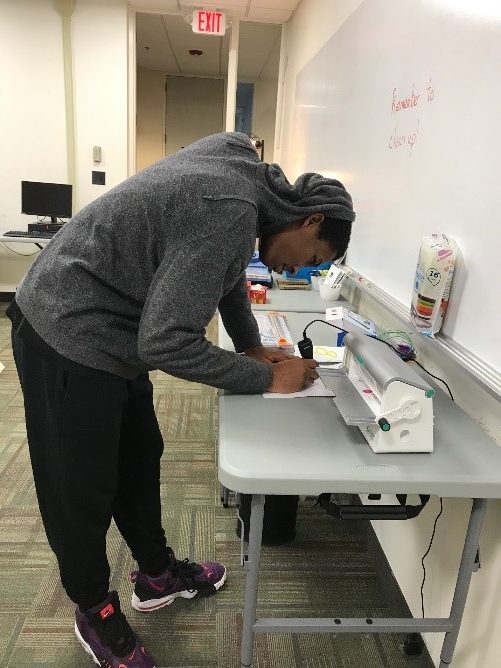 The Maker Movement has been gaining momentum over the past 14 years with the publication of MAKE magazine in 2005 and the first Maker Faire sponsored by John Dougherty. The book titled Invent to Learn, 2nd Ed. (2019) has become what is known as the Maker’s Movement Bible. Written by Sylvia Libow Martinez and Gary Stager, the book goes into detail about how teachers and students can let loose their creativity in a myriad of ways if they are provided with space and materials to do so.
The Maker Movement has been gaining momentum over the past 14 years with the publication of MAKE magazine in 2005 and the first Maker Faire sponsored by John Dougherty. The book titled Invent to Learn, 2nd Ed. (2019) has become what is known as the Maker’s Movement Bible. Written by Sylvia Libow Martinez and Gary Stager, the book goes into detail about how teachers and students can let loose their creativity in a myriad of ways if they are provided with space and materials to do so.
There have always been “makers” who used their hands, brains, and hearts to invent and produce the things that people use for work and play. Classrooms have long been known as places where students could be caught making things on any given day. Why the hype about maker spaces, then?
Perhaps it has to do with the disconnect that appears to have occurred due to the technology revolution that has moved learning through exploring with material objects to learning from screens. On our small campus in Northeast Ohio, we have seen a constant move toward emptying the library of books and journals in favor of digital texts. Getting a hard copy of a textbook from publishing companies is becoming more of a challenge as well. Students on all levels rely more on Google than library stacks to conduct their research. It may be that the pendulum, as it always does, is beginning to swing the other way, and humans are craving the need to get back to hands-on learning that can leave printing ink on your hands, and clay under your finger nails.
19 Nov2019
By Jane E. West

This blog post is written by AACTE consultant Jane West and is intended to provide update information. The views expressed in this post do not necessarily reflect the views of AACTE.
Congress Still Working to Avoid that Government Shutdown
The current continuing resolution—a bill that keeps the government temporarily funded – expires next week, on November 21. Congressional leaders have been scrambling this week to find a way to keep government funding extended beyond that time, and thus avoid a government shutdown. They appear to be closing in on another temporary funding extension—through December 20—predicated on progress on the big obstacle, which is agreeing on top line totals for each of the 12 funding bills. Since the House and Senate did not agree on those totals before they wrote their bills, there are significant discrepancies which can only be resolved by a House/Senate agreement on one figure for each bill. This is critical for the bill that funds education, as the House bill is about $5 billion more generous for education than the Senate draft bill.
18 Nov2019
By Lynn M. Gangone
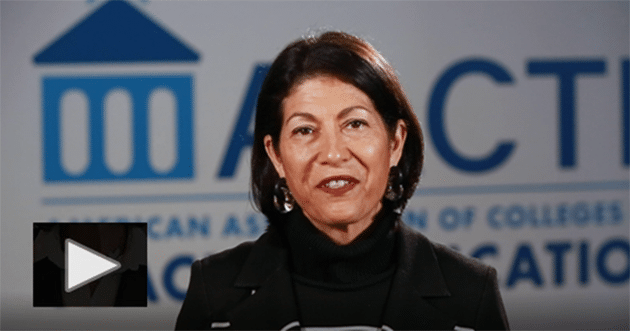 The AACTE National Office Staff and I wish you a peaceful holiday and are grateful for your active involvement in AACTE. In this video, I share updates about what’s happening in the Association as we near the end of the year, including the latest details on the 2019 AACTE Board of Directors Election. Remember to cast your vote by November 29.
The AACTE National Office Staff and I wish you a peaceful holiday and are grateful for your active involvement in AACTE. In this video, I share updates about what’s happening in the Association as we near the end of the year, including the latest details on the 2019 AACTE Board of Directors Election. Remember to cast your vote by November 29.
Please take a moment to watch the video message below (or read the transcript) to discover how you can stay involved with AACTE this holiday season.
14 Nov2019
By Jerrica Thurman
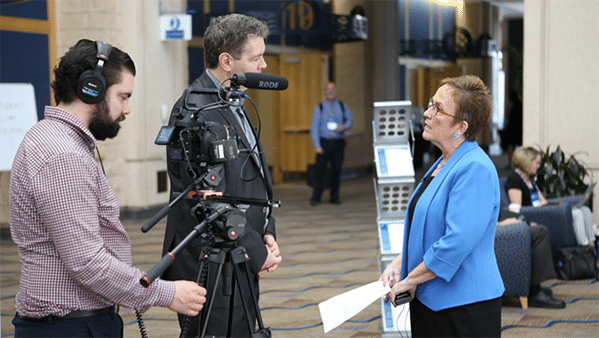 Come make your voice heard at the AACTE Studio—the latest addition in the AACTE Gallery during the 2020 Annual Meeting. Share your perspectives on important issues in educator preparation and the Association’s new strategic direction during short video interviews. This is your chance to elevate what’s happening in education at your institution and in your local communities. The AACTE Gallery also offers opportunities to engage and learn about promising innovations in educator preparation from AACTE members and partners through interactive presentations. Morning and afternoon sessions will be held on Friday, February 28, and Saturday, February 29. Presentations will include
Come make your voice heard at the AACTE Studio—the latest addition in the AACTE Gallery during the 2020 Annual Meeting. Share your perspectives on important issues in educator preparation and the Association’s new strategic direction during short video interviews. This is your chance to elevate what’s happening in education at your institution and in your local communities. The AACTE Gallery also offers opportunities to engage and learn about promising innovations in educator preparation from AACTE members and partners through interactive presentations. Morning and afternoon sessions will be held on Friday, February 28, and Saturday, February 29. Presentations will include
- AACTE Holmes Program Poster Sessions
- National Association of Community College Teacher Education Programs (NACCTEP) Poster Sessions
- AACTE Membership and Programs Updates
14 Nov2019
By Meghan Grenda
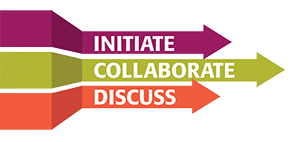 Are you interested in connecting with colleagues that share your interests and have similar areas of expertise? If so, AACTE encourages you to join one of our Topical Action Groups (TAGs).
TAGs are AACTE action-oriented working groups that focus on areas such as accreditation, Historically Black Colleges and Universities (HBCUs), elementary education, research in teacher preparation, international education, and women in leadership–just to name a few. In addition to collaborating with your peers, AACTE provides TAGs with operational funds, marketing and staff support, and complimentary meeting space at the AACTE Annual Meeting.
Are you interested in connecting with colleagues that share your interests and have similar areas of expertise? If so, AACTE encourages you to join one of our Topical Action Groups (TAGs).
TAGs are AACTE action-oriented working groups that focus on areas such as accreditation, Historically Black Colleges and Universities (HBCUs), elementary education, research in teacher preparation, international education, and women in leadership–just to name a few. In addition to collaborating with your peers, AACTE provides TAGs with operational funds, marketing and staff support, and complimentary meeting space at the AACTE Annual Meeting.
14 Nov2019
By Ward Cummings

This article, written by AACTE Director of Government Relations K. Ward Cummings, originally appeared in the Daily News Opinion section and is reprinted with permission.
The civil rights leader Malcolm X once famously said that the most segregated hour in American life is high noon on Sunday. If he were alive today, he might also include those weekday hours between 9 a.m. and 3 p.m. when our children are in school.
This past May was the 65th anniversary of Brown vs. Board of Education. The occasion inspired numerous panel discussions, seminars and reports about how much or how little the state of education has changed in the last half-century. Sadly, considerable attention also was paid to the subject of how segregated American schools remain 65 years later.
14 Nov2019
By Jacqueline E. King, Ph.D.
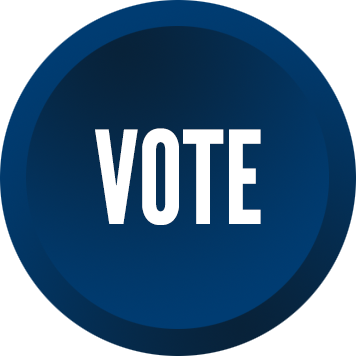 You may think that the next big election will occur in a few months in Iowa. Actually, an important election is underway and, regardless of where you live, now is the time to vote!
The 2019 election for the AACTE Board of Directors is underway through November 29. All AACTE Institutional and Chief Representatives are eligible to vote.
Four new seats will be selected via online voting:
You may think that the next big election will occur in a few months in Iowa. Actually, an important election is underway and, regardless of where you live, now is the time to vote!
The 2019 election for the AACTE Board of Directors is underway through November 29. All AACTE Institutional and Chief Representatives are eligible to vote.
Four new seats will be selected via online voting:
- two at-large seats
- one seat representing the Association of Independent Liberal Arts Colleges for Teacher Education (AILACTE)
- one seat representing the Council of Academic Deans from Research Education Institutions (CADREI)
14 Nov2019
By Bryan Cook and William (Bill) Therrian
The motto of the Royal Society, “Nullius in verba” translates as “Take nobody’s word for it.” However, when educators read journal articles reporting research findings, transparency is limited. For example, educators only see authors’ reports of findings, and do not have access to data (to verify reported findings) or to the details of the research procedures (to examine, for example, whether researchers developed their hypotheses after knowing the results). This lack of transparency is potentially problematic, because researchers may be driven to find and report positive and significant findings to enhance the odds of publication. Indeed, many educational researchers report engaging in questionable research practices that might help generate positive, but potentially biased, research findings (Makel, Hodges, Cook, & Plucker, 2019). Open science is an umbrella term, encompassing diverse initiatives that aim to increase transparency in research. We briefly describe three open-science practices here: pre-registration, Registered Reports, and open data.
13 Nov2019
By JTE Insider

Read the latest JTE Insider blog interview by the Journal of Teacher Education (JTE) editorial team. This blog is available to the public, and AACTE members have free access to the articles in the JTE online archives—just log in with your AACTE profile.
In this interview, The JTE editorial team shares insights from the Sue C. Kimmel and Danielle E. Hartsfield, co-authors of the article “It Was . . . the Word ‘Scrotum’ on the First Page”: Educators’ Perspectives of Controversial Literature, published in the September/October 2019 issues of the Journal of Teacher Education.
What motivated you to pursue this particular research topic?
Sue: We both teach children’s literature, and we were interested in how our students who were pre-service educators reacted to controversy in children’s literature. We believe in the power of literature to promote empathy and positive inquiry into social issues. We were concerned with the willingness of pre-service educators to avoid “controversy” in the classroom and library with little critical thought about what it meant to withhold quality literature about difficult topics from their students.
12 Nov2019
By Katrina Norfleet
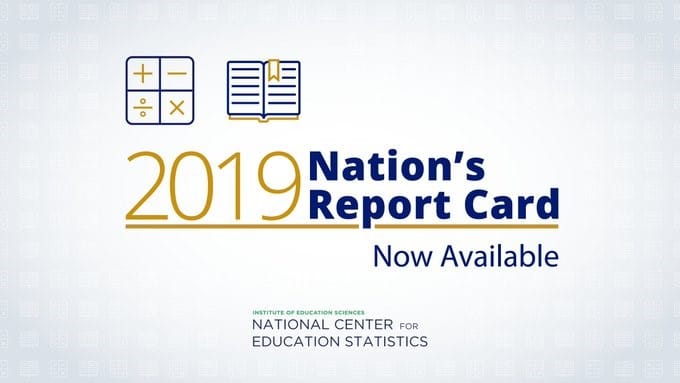 The recent release of the 2019 Nation’s Report Cards for mathematics and reading in grades 4 and 8 illustrates a growing disparity in achievement between the highest and lowest achieving students. The results show the divergence is happening across the nation, across states, and for student groups by race/ethnicity and socioeconomic status.
The recent release of the 2019 Nation’s Report Cards for mathematics and reading in grades 4 and 8 illustrates a growing disparity in achievement between the highest and lowest achieving students. The results show the divergence is happening across the nation, across states, and for student groups by race/ethnicity and socioeconomic status.
The National Assessment of Educational Progress (NAEP), widely known as the Nation’s Report Card, provides data from the nation, states/jurisdictions, and urban school districts that volunteer to participate in the Trial Urban District Assessment (TUDA). Approximately 296,900 fourth- and eighth-grade students across the nation participated in the 2019 mathematics assessment and nearly 294,000 fourth- and eighth-grade students across the nation participated in the 2019 reading assessment. Results are available for the 50 states, the District of Columbia, and Department of Defense schools, as well as for the 27 participating large urban districts.



 You are vital to AACTE. Your membership, your service, your knowledge, and your presence are vital to the organization.
You are vital to AACTE. Your membership, your service, your knowledge, and your presence are vital to the organization. 


 The Maker Movement has been gaining momentum over the past 14 years with the publication of MAKE magazine in 2005 and the first Maker Faire sponsored by John Dougherty. The book titled Invent to Learn, 2nd Ed. (2019) has become what is known as the Maker’s Movement Bible. Written by Sylvia Libow Martinez and Gary Stager, the book goes into detail about how teachers and students can let loose their creativity in a myriad of ways if they are provided with space and materials to do so.
The Maker Movement has been gaining momentum over the past 14 years with the publication of MAKE magazine in 2005 and the first Maker Faire sponsored by John Dougherty. The book titled Invent to Learn, 2nd Ed. (2019) has become what is known as the Maker’s Movement Bible. Written by Sylvia Libow Martinez and Gary Stager, the book goes into detail about how teachers and students can let loose their creativity in a myriad of ways if they are provided with space and materials to do so. 
 The AACTE National Office Staff and I wish you a peaceful holiday and are grateful for your active involvement in AACTE. In this video, I share updates about what’s happening in the Association as we near the end of the year, including the latest details on the
The AACTE National Office Staff and I wish you a peaceful holiday and are grateful for your active involvement in AACTE. In this video, I share updates about what’s happening in the Association as we near the end of the year, including the latest details on the  Come make your voice heard at the AACTE Studio—the latest addition in the AACTE Gallery during the 2020 Annual Meeting. Share your perspectives on important issues in educator preparation and the
Come make your voice heard at the AACTE Studio—the latest addition in the AACTE Gallery during the 2020 Annual Meeting. Share your perspectives on important issues in educator preparation and the  Are you interested in connecting with colleagues that share your interests and have similar areas of expertise? If so, AACTE encourages you to join one of our
Are you interested in connecting with colleagues that share your interests and have similar areas of expertise? If so, AACTE encourages you to join one of our 
 You may think that the next big election will occur in a few months in Iowa. Actually, an important election is underway and, regardless of where you live, now is the time to vote!
The 2019 election for the AACTE Board of Directors is underway through November 29. All AACTE Institutional and Chief Representatives are eligible to vote.
Four new seats will be selected via online voting:
You may think that the next big election will occur in a few months in Iowa. Actually, an important election is underway and, regardless of where you live, now is the time to vote!
The 2019 election for the AACTE Board of Directors is underway through November 29. All AACTE Institutional and Chief Representatives are eligible to vote.
Four new seats will be selected via online voting:

 The recent release of the 2019 Nation’s Report Cards for mathematics and reading in grades 4 and 8 illustrates a growing disparity in achievement between the highest and lowest achieving students. The results show the divergence is happening across the nation, across states, and for student groups by race/ethnicity and socioeconomic status.
The recent release of the 2019 Nation’s Report Cards for mathematics and reading in grades 4 and 8 illustrates a growing disparity in achievement between the highest and lowest achieving students. The results show the divergence is happening across the nation, across states, and for student groups by race/ethnicity and socioeconomic status.